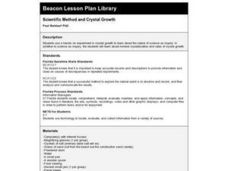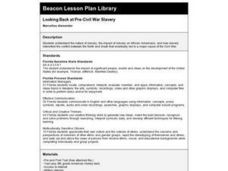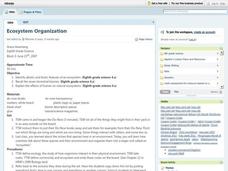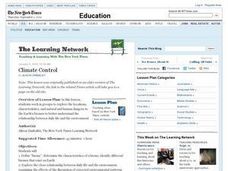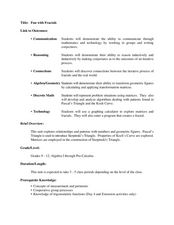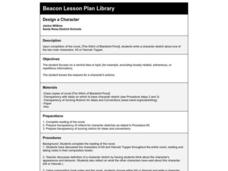Curated OER
Tessellations
Students identify and construct figures that tessellate. They investigate which regular polygons tessellate and how to modify them to make other tessellating figures. Students explore how naturally occurring tessellations have been...
Curated OER
Scientific Method and Crystal Growth
Students conduct a hands-on experiment growing crystals to demonstrate the nature of science as inquiry. They discuss and test variables that affect crystal growth. They research mineral crystallization and mineral formation on the...
Curated OER
What Is A Community?
Students engage in a lesson which introduces the definition of a community and challenges them to explore the characteristics of their own community. This lesson uses the true story of Humphrey the Lost Whale as an illustration of how...
Curated OER
Justice Demands an End to Segregation, But it Does Not End
Students define human rights and describe how it applies to politics, economics and cultural rights. As a class, they watch a video how the Constitution was made and discuss its purpose. In groups, they present information to the class...
Curated OER
The Case of the Broken Loop
In this environmental awareness activity, learners complete 8 pages pertaining to waste, landfills, recycling and composting. Included are: matching words and definitions, crossword puzzle, scrambled letters, a code, word search and a...
Curated OER
Laurence Yep's, Dragonwings
Middle schoolers discuss vocabulary words and compare definitions. They read chapters 6-9 of the novel, Dragonwings, and discuss point of view, and complete a plot diagram. Then they review the four types of conflict and identify the...
University of Miami
What is it? Weathering, Erosion, or Deposition?
Just as rocks move through the rock cycle, your giddy geologists will move descriptions around until they are all in the correct category. After cutting out several types of rock movement, learners determine whether the action is...
Curated OER
Mathematics: Technology and Connections
Sixth graders interpret and replicate patterns. In this patterns lesson, 6th graders are given an item with a definite pattern which they must replicate using a calculator or computer and then justify how they relate. Students...
Curated OER
Looking Back at Pre-Civil War Slavery
Eighth graders explain the nature of slavery, the impact of slavery on African-Americans, and how slavery intensified the conflict between the North and South that eventually led to a major cause of the Civil War.
Curated OER
Ecosystem Organization
Eighth graders engage in a lesson about ecosystems with the intention of looking at how it is organized. They cover the biotic and abiotic factors of an ecosystem while looking at the seven types of terrestrial biomes. Students write...
Curated OER
Me on the Map Lesson 1
Students use maps, globes, geographic information systems and other
sources of information to analyze the nature of places at a variety of scales. They identify on a map and determine the population
of the city, county, state, country...
Curated OER
Are You One of Us?
Students investigate how scientists sort and classify organisms. In this sorting and classifying lesson, students examine what systematics are as tools that scientists use. They examine images of invertebrates and sort them while stating...
Curated OER
Climate Control
Students explore the locations, characteristics, and natural and human dangers to the Earth's biomes to better explain the relationship between daily life and the environment.
Curated OER
Critical Consumerism
Students identify the role of advertisements in their environment. In this advertisement instructional activity, students find advertisements in their classrooms and discuss them. Students write a definition for advertisements and...
Curated OER
Fun With Fractals
Learners use fractals to analyze nature. In this geometry lesson, students work in groups using technology and math to communicate. They identify where in the real world fractal can be seen.
Curated OER
Disasters - Where, When, Why
Fourth graders research natural disasters that have occurred in the US in the 20th Century. They create a computer database of the disasters and write a paragraph with the information.
Curated OER
Globalization: The Garment Industry in Southeast Asia
Students are introduced to the concept of globalization. In groups, they read primary source documents to view sweatshops from different points of view. They write a paper about the impact of globalization on the garment industry and...
Curated OER
Science - Magnets and Non-Magnets
In this science worksheet, students identify magnetic and non-magnetic items. They match 8 items to their definitions, and answer 6 short answer questions in which they tell what they know about magnets and the electrical method.
Smarter Balanced
Archaeological Discoveries
Artifacts, inscriptions, and monuments. Here's an activity designed to ensure that all learners are familiar with the key terms and concepts they will need to begin a study of archaeological discoveries.
Curated OER
The Legendary Raptors
How are raptors and airplanes alike? Combine science and language arts in this fun and interactive project. Young scientists research the animal in order to design their own aircraft, and compete in a contest for farthest, fastest, and...
Curated OER
In the Scheme of Things
Fifth graders examine the food webs of different animals. They discuss the characteristics of those animals as well. They work together to develop their own definition for the word niche.
Curated OER
Living, Non-Living Mobile
Middle schoolers are introduced to the concept of living and nonliving organisms in general and participate in a starter activity where they build their own definitions of living and nonliving organisms.They sort organisms into living...
Curated OER
Wheels and Rainbows
Fourth graders produce 4 small works of art that be pasted or glued onto the back of the colored construction paper. They choose crayons, watercolor markers, watercolor paints, or colored pencils to produce their designs.
Curated OER
Mystery Polymers
Students examine how some natural substances are polymers. In this polymer lesson students complete a lab and give examples of a physical change.



